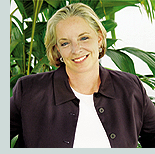Barbara Luke: Helping Grow Healthy Moms and Babies

![]() hen Barbara Luke was a young girl, her mother always used to say, “Don’t
just sit there—make yourself useful.” Most kids would just
set the table and forget the words. Luke never did.
hen Barbara Luke was a young girl, her mother always used to say, “Don’t
just sit there—make yourself useful.” Most kids would just
set the table and forget the words. Luke never did.
So she made herself useful, first acquiring four degrees, including an undergraduate degree in nursing from Columbia University, a master’s degree in foods and nutrition from New York University and another in population studies from Columbia, and a doctoral degree in maternal and child health from Johns Hopkins University. Then she embarked on a quest to improve the health and nutrition of pregnant women and their babies. Luke, now a professor at the School of Medicine with joint appointments in epidemiology and public health and in obstetrics and gynecology, specializes in multiple births.
Even before she joined the school two years ago, Luke was familiar with Miami, having collaborated with Mary Jo O’Sullivan, M.D., currently vice chair and medical director of research in obstetrics and gynecology, for several years in the University Consortium on Multiple Births. Multiple births used to be such a rare occurrence that they were often excluded from studies, Luke says. Despite the rarity, there was still a need for information about the health risks and issues of multiple birth pregnancies, so Luke formed the consortium as a doctoral student at Johns Hopkins. Four centers were included: UM, Johns Hopkins, University of Michigan, and the Medical University of South Carolina.
Half of those in the consortium’s databank were from Miami. “We have a very fertile population here,” Luke says. The databank, which recorded 300 multiple births in its first ten years, now has more than 3,500 twin, triplet, and quad births in the system. “They’ve become much more common for a couple of reasons: more and more women are postponing having babies,” Luke says. “We’re older than our mothers were, and older age often comes with infertility.” Treatment for infertility significantly increases the likelihood of multiple births, and advanced maternal age also means there’s a higher risk for multiple births.
Luke just published the second edition of her book,
When You’re Expecting
Twins, Triplets, or Quads, which is ranked among the top 10 best-selling pregnancy
books in the United States. She was recently awarded her first grant from the
National Institutes of Health and was named the 2005 recipient of the Agnes Higgins
Award in Maternal Nutrition from the March of Dimes. But what Luke is most proud
of are the e-mails she gets from moms who are gazing at their healthy twins or
triplets in the middle of the night. And then she thinks, “Yes, I’ve
made myself useful.” ![]()